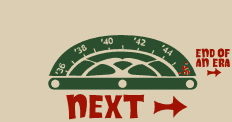|
|
 |
 |
 |
 |
 |
 |
 |
 |
 |
|
|
 |
 |
 |
 |
In the News
• Germany invades Soviet Union (1941)
• Japan bombs Pearl Harbor; United States enters World War II (1941)
• Tide of Pacific war turns with U.S. victory at Midway Island (1942)
• Allies invade North Africa (1942)
• Roosevelt and Churchill meet at Casablanca (1942)
• German Army defeated at Stalingrad (1943)
• Roosevelt elected to fourth term as U.S. president (1944)
• Allied troops invade Normandy, France, on D-Day (1944)
• Roosevelt dies and Harry S. Truman becomes U.S. president (1945)
• Germany surrenders (1945)
• United States drops first atomic bombs, on Hiroshima and Nagasaki, Japan (1945)
• Japan surrenders, ending World War II (1945)
On the Bookshelf
• The Last Tycoon, by F. Scott Fitzgerald (1941)
• Berlin Diary, by William L. Shirer (1941)
• The Last Time I Saw Paris, by Elliot Paul (1942)
• Here Is Your War, by Ernie Pyle (1943)
• Guadalcanal Diary, by Richard Tregaskis (1943)
• A Bell for Adano, by John Hersey (1944)
• The Razor's Edge, by W. Somerset Maugham (1944)
• Harvey, by Mary Chase (1945)
• Animal Farm, by George Orwell (1945)
• Brideshead Revisited, by Evelyn Waugh (1945)
At the Movies
• The Big Store, starring the Marx Brothers (1941)
• Citizen Kane, directed by and starring Orson Welles (1941)
• Bambi, produced by Walt Disney (1942)
• Mrs. Miniver, starring Greer Garson (1942)
• Casablanca, starring Humphrey Bogart (1943)
• Henry V, starring Laurence Olivier (1944)
• Lifeboat, directed by Alfred Hitchcock (1944)
• The Lost Weekend, directed by Billy Wilder (1945)
Out and About
• New York Yankees slugger Joe DiMaggio hits safely in 56 straight games (1941)
• United States rations coffee, sugar and gasoline (1942)
• Zoot suits hit the dance floor (1943)
• Jitterbug overtakes lindy hop as nation's most popular dance (1943)
• Ringling Bros. Circus fire kills 165 in Hartford, Conn. (1944)
• Bebop becomes new music craze (1945)

|
|
 |
"Take the 'A' Train" (Strayhorn), performed by Duke Ellington
One of the pre-eminent American composers of the 20th century ("In a Sentimental Mood," I'm Just a Lucky So-and-So" and "Satin Doll" are only a few of his many compositions), Ellington was also a tireless bandleader, bringing Swing to the masses with his orchestra during a long and illustrious career. In their performance of "Take The 'A' Train" and countless other tunes, Ellington and his band brought a technicality and sophistication to the uproarious Swing scene that lent artistic credibility to the vastly popular musical genre.
"Boogie Woogie Bugle Boy" (Raye/Prince), performed by the Andrews Sisters
With such hits as "Bei mir bist du schöön," "Don't Sit Under the Apple Tree" and "Rum and Coca-Cola," LaVerne, Maxene and Patty -- the Andrews Sisters -- became one of the most popular acts in the country during the 1930s and 1940s. "Boogie Woogie Bugle Boy" was a wartime favorite both with the troops and with music fans at home. The Andrews Sisters' frequent gigs included appearances with the Glenn Miller Orchestra and performances on numerous radio programs and in many films.
"Sentimental Journey" (Green/Brown/Homer), performed by Les Brown and His Band of Renown
With vocalist Doris Day, Les Brown and His Band of Renown released this record, which topped the charts for 16 weeks and went on to become a standard in the band's repertoire. Brown and his band continued for decades, well beyond the demise of the Big Band genre, and, in 1996, they were honored in the Guinness Book of World Records as the longest-running musical organization in the history of popular music.
The music featured on this page is from the Big Band Magic 2-CD set available as a thank-you gift when you pledge the Big Band Magic! program.
|
|
 |
Copyright © 2003 KQED, Inc. All Rights Reserved. |
 |
 |
 |
 |
 |
 |
 |
 |
|
|
